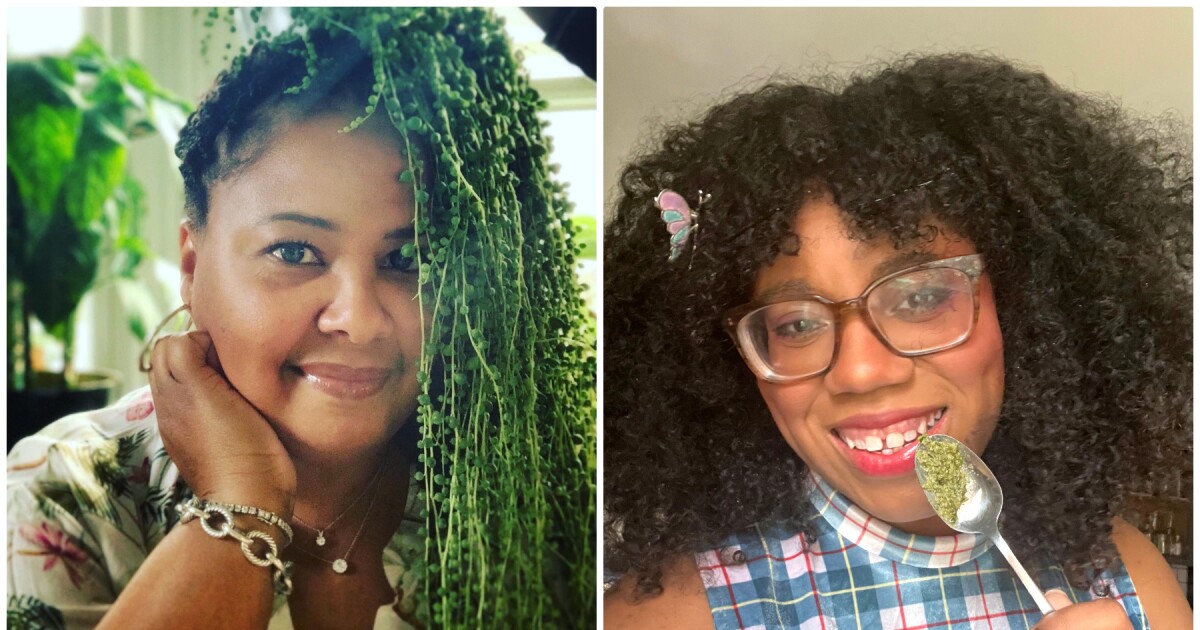Foraging, gardening, joy – how two black plant influencers use their platforms
Black history often centers on the pain and suffering of black people, from movable slavery to modern police brutality. But look closely and you will find hope, a community, and an existence that extends beyond marginalization, especially when it comes to plants.
We spoke with two famous plant influencers – Alexis Nikole Nelson, known on TikTok as Black forager, and Instagram gardener Kamili Bell Hill, who runs Plant Blerd and Black People with Plants – and asked them to share how they use their platforms to celebrate the connection between black joy and plants while providing cheerful plant selections that all plant lovers can enjoy.
Plants ‘flipped a switch in me’
“I was really lucky to have a love of the outdoors on both sides of my family because I know that all black children, especially black children in Ohio, are not fortunate enough. to have it, â€Nelson, who still lives in Ohio, mentioned.
As a child, she learned that plants that some may think of as weeds are not only edible, but in some cases exceptionally tasty.
Realizing that the plants were able to “flip a switch in me,†she said. “The rest of my childhood, every time someone mentioned a random plant that I recognized as edible, I was like, ‘Oh, my God, okay, I have to put this away for later. “”
Nelson found use in his mental inventory of edible plants in college. Her budget was tight and she didn’t want to eat ramen and ice cream every day. So she started including curly quai leaves in stir-fried noodles and lamb quarters in her salads.
Today, his TikTok channel has 2.9 million followers and 51.9 million likes. But she started out small. What started out as running a corporate TikTok account that had nothing to do with foraging turned into Nelson deciding to explore the app on his own. When the pandemic started, she used her skills to help people access food safely and for free.
“I just filmed the video while walking through my neighborhood and I said, ‘Here are five plants that I know you can find in your neighborhood to help you with your groceries, because we’re all a little nervous at the idea to go to the grocery store right now, ‘”and the video was exceptionally well executed.
Why does she identify as a black forager and not just a forager?
“For me, foraging as a black woman is a rebellion through the restoration of knowledge,” she said, captioning a video on the subject “Black history meets joy of Blacks “.
“I would describe the black joy as simple, unrestrained enjoyment of whatever we want to do,†she said. “No restraint. No perception worries. Don’t worry whether or not we fit into some kind of social construct. Just looking at everything that gets us out of bed in the morning without apologizing. This is what black joy looks like to me.
Nelson says she finds black joy when she is authentically herself: out with her little basket, trowel and boots in an uncharted forest, beach or river.
But she still has to face the trolls.
“I always get an influx of comments about my appearance, the color of my skin, my hair, the space between my teeth – a lot of people just feel entitled to express their completely unwanted opinions about who I am and where I am. way I present myself to the world, â€she said.
But Nelson does not accept the harassment.
When she defends herself, people sometimes react with anger, as if such a jovial person is not allowed to react to the abuse and defend themselves. She said she felt some people would prefer her to fit into a minstrel stereotype.
“Sometimes I’m really scared to fit into this role of an almost hacker mom where I’m always there to be calm, cool and accommodating for questions, for unwanted comments. And that’s not what we’re trying to do here at all, â€she said.
Nelson likes to remind people that she is not only “allowed to respond” to racist comments, but that she is also allowed to call out to people who think her joy is only for their consumption.
She wants to foster a nurturing community, where everyone can develop a taste for foraging.
As to where to start, Nelson recommends foraging in the ocean for edible algae. Other plants that she happily feeds on include American persimmons, papayas, wood nettles and seaweed, which grow near Ohio streams, “where they can keep their feet wet.”
Celebrate the “daily joy of blacksâ€
“I grew up around my mother and my grandmother. My grandmother had an edible garden and my mother had all the houseplants. So there is no corner of my childhood where plants were not involved. I spent a lot of Saturdays with the two of them, â€said Hill, who lives in New York City, where she works as an interior designer.
In fact, buying a fiddle leaf fig tree for a customer is what drove their love of gardening to excess.
“I like to do it for peace and relaxation. I mean, there are so many benefits, but it also feels like a real connection to my past and with my grandmother, with my mom. There is a lot of connectivity with plants for me.
When she wanted to share her love of plants with others, Hill found that her friends and family weren’t so enthusiastic. So she decided to create her own communities of black gardeners on Instagram: Plantblerd and BlackPeopleWithPlants.
“Blerd†is a “Black nerd†coat rack, and Hill created Plantblerd, which now has nearly 29,000 followers, as a space for black people interested in plants.
“There was this whole community that I didn’t know anything about, and it was really like a real breath of fresh air for me, because it’s also something that I do for my own pleasure that has nothing to do with it. to be a mother, a wife, a designer. It’s just my thing. It allowed me to carve out my pleasure and creativity.
BlackPeopleWithPlants – “A love letter to blacks with plants,†according to the Instagram bio – features black gardeners from around the world. The account has amassed nearly 31,000 subscribers.
“We are more than a hashtag. There is more than trauma in our lives, â€she said. “I want to celebrate our daily black joy.”
Hill founded this Instagram account in the summer of 2020. She noticed that after the deaths of George Floyd and Breonna Taylor and as Black Lives Matter was all the rage, black content was featured more on social platforms. But only in response to the death and suffering of black people. The Black Lives Matter alliance eventually began to fade, and black content – especially that focused on dark joy – became harder for her to find.
So she decided to create a page that would focus on the collective joy of black gardening communities.
“I would describe Dark Joy as brash, and in a very good way. I think it’s really important because plants are healing, and collectively we need healing. You know, I think there is still a stigma in our community to seek traditional therapy, and herbs are very therapeutic, â€she said.
The trauma of slavery can be seen as disconnecting black people from the pleasure of feeding the land. Personal gardening under slavery was often done to supplement meager diets; search for food to facilitate the escape. For Hill and others, rediscovering the connection with joy can be a catharsis that modern medicine and therapy does not necessarily achieve.
“If there is a group of people who desperately need [a healing connection with plants], these are people of color, especially blacks. So I think that’s why it’s really important for black people to grow taller, and I encourage any black person I meet to have plants in their life.
Hill helps people have plants in their lives by always having a cutting or succulent ready to go home with a guest.
Hill recommends the classic Monstera deliciosa because “the leaves are those big, beautiful, windowed leaves that unfurl and they’re a brilliant neon green. They give me immense joy.
She also suggests growing hoyas, mini monstera, ZZ plant, manjula pothos, and golden pothos.

